Top Rankings
Stuttgart School District ranks among the top 20% of public school district in Arkansas for:
Category
Attribute
Graduation Rate
Highest graduation rate (Top 20%)
Diversity
Most diverse schools (Top 1%)
For the 2025 school year, there is 1 public middle school serving 247 students in Stuttgart School District. This district's average middle testing ranking is 4/10, which is in the bottom 50% of public middle schools in Arkansas.
Public Middle School in Stuttgart School District have an average math proficiency score of 29% (versus the Arkansas public middle school average of 36%), and reading proficiency score of 32% (versus the 42% statewide average).
Minority enrollment is 55% of the student body (majority Black), which is more than the Arkansas public middle school average of 41% (majority Black).
Overview
This School District
This State (AR)
# Schools
4 Schools
352 Schools
# Students
1,544 Students
147,541 Students
# Teachers
119 Teachers
13,335 Teachers
Student : Teacher Ratio
13:1
13:1
District Rank
Stuttgart School District, which is ranked within the bottom 50% of all 258 school districts in Arkansas (based off of combined math and reading proficiency testing data) for the 2021-2022 school year.
The school district's graduation rate of 90-94% has increased from 80-84% over five school years.
Overall District Rank
#208 out of 259 school districts
(Bottom 50%)
(Bottom 50%)
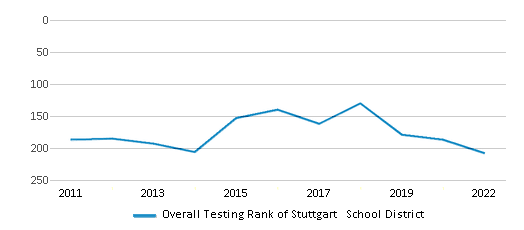
Math Test Scores (% Proficient)
25%
38%
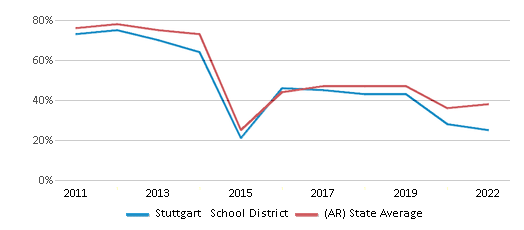
Reading/Language Arts Test Scores (% Proficient)
25%
40%
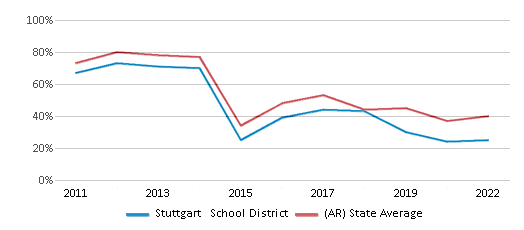
Science Test Scores (% Proficient)
26%
36%
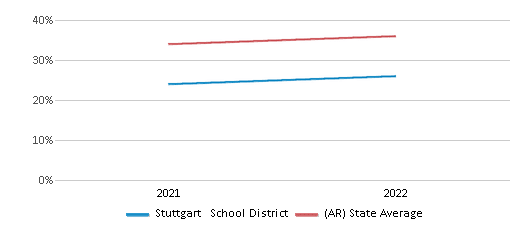
Graduation Rate
90-94%
88%
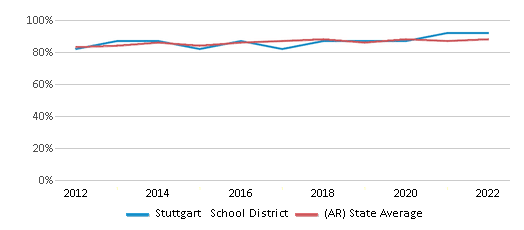
Students by Ethnicity:
Diversity Score
0.65
0.60
# American Indian Students
6 Students
846 Students
% American Indian Students
1%
1%
# Asian Students
18 Students
2,865 Students
% Asian Students
1%
2%
# Hispanic Students
168 Students
21,477 Students
% Hispanic Students
11%
14%
# Black Students
660 Students
28,045 Students
% Black Students
43%
19%
# White Students
606 Students
87,000 Students
% White Students
39%
59%
# Hawaiian Students
4 Students
1,533 Students
% Hawaiian Students
n/a
1%
# Two or more races Students
82 Students
5,775 Students
% of Two or more races Students
5%
4%
Students by Grade:
# Students in PK Grade:
-
20
# Students in K Grade:
118
725
# Students in 1st Grade:
114
806
# Students in 2nd Grade:
131
836
# Students in 3rd Grade:
115
826
# Students in 4th Grade:
106
1,120
# Students in 5th Grade:
109
4,995
# Students in 6th Grade:
95
20,844
# Students in 7th Grade:
115
36,641
# Students in 8th Grade:
132
37,270
# Students in 9th Grade:
146
18,603
# Students in 10th Grade:
131
8,958
# Students in 11th Grade:
106
8,347
# Students in 12th Grade:
118
7,514
# Ungraded Students:
8
36
District Revenue and Spending
The revenue/student of $12,360 in this school district is less than the state median of $13,132. The school district revenue/student has stayed relatively flat over four school years.
The school district's spending/student of $11,722 is less than the state median of $13,043. The school district spending/student has stayed relatively flat over four school years.
Total Revenue
$19 MM
$6,371 MM
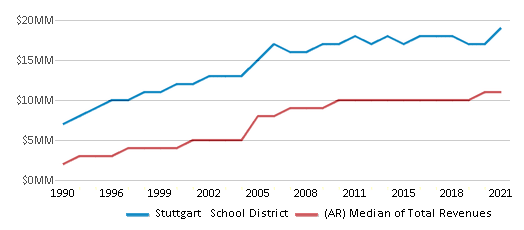
Spending
$18 MM
$6,327 MM
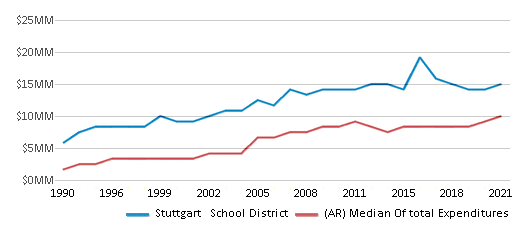
Revenue / Student
$12,360
$13,132
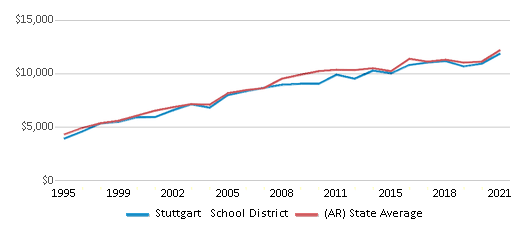
Spending / Student
$11,722
$13,043
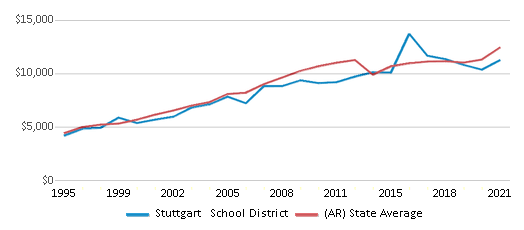
Best Stuttgart School District Public Middle Schools (2025)
School
(Math and Reading Proficiency)
(Math and Reading Proficiency)
Location
Grades
Students
Rank: #11.
Stuttgart Junior High School
(Math: 29% | Reading: 32%)
Rank:
Rank:
4/
Bottom 50%10
2501 S Main
Stuttgart, AR 72160
(870) 673-3562
Stuttgart, AR 72160
(870) 673-3562
Grades: 7-8
| 247 students
Recent Articles

What Is A Charter School?
Explore the world of charter schools in this comprehensive guide. Learn about their history, how they operate, and the pros and cons of this educational innovation. Discover key facts about charter schools, including admission policies, demographics, and funding, as well as what to look for when considering a charter school for your child.

10 Reasons Why High School Sports Benefit Students
Discover the 10 compelling reasons why high school sports are beneficial for students. This comprehensive article explores how athletics enhance academic performance, foster personal growth, and develop crucial life skills. From improved fitness and time management to leadership development and community representation, learn why participating in high school sports can be a game-changer for students' overall success and well-being.

February 05, 2025
Understanding the U.S. Department of Education: Structure, Impact, and EvolutionWe explore how the Department of Education shapes American education, from its cabinet-level leadership to its impact on millions of students, written for general audiences seeking clarity on this vital institution.





